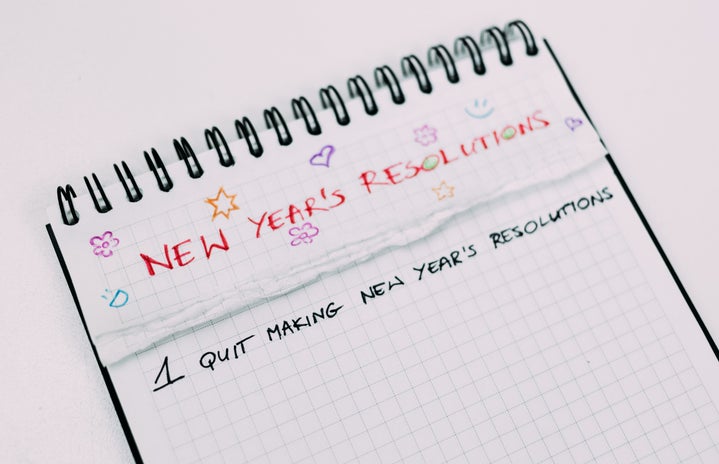Traditions are built into almost every holiday— they work as guidelines for what it means to celebrate something. For Halloween we carve pumpkins, on Christmas we exchange gifts, and on New Years we set resolutions. Usually one of the classics. Maybe it’s that I want to learn a new language, or exercise more. I’ll stick to it for a week, maybe two. Maybe even for all of January. And then the inevitable happens—something comes up, and I miss my Duolingo lesson or it rains and I can’t go on my run, and just like that the old habits return. This cycle makes me understand why New Year’s Resolutions have been falling out of style recently, but I also believe there is way to prevent it from happening. I am pro New Year’s resolutions because they provide a great reflection benchmark, and these are the steps I take to make resolutions that work for me.
First, I reflect on the year that passed. I usually do this by writing some of my favourite memories from each month in my journal. For example, for my Reading Week trip to London I simply wrote “London” under October, but I also wrote “weighted blankets” under November to refer to an inside joke with my friends. This is not only a great way to summarise the year, but it is also entertaining to read back on in later years and helpful to remember the things that made that year different from all the other ones.
Then I usually read back through my resolutions from the year before and write down how it went and why, and how I felt about it. Did I actually do it consistently? Did it happen naturally, or did it require a lot of effort? Did it have a positive impact on my year? Am I glad I did so? This is why I love writing about my resolutions in my journal – it makes it easier to look back and do it again the next year.
Reflecting and considering how each resolution went for me shapes my choice of resolutions for the upcoming year. It also keeps me realistic – as I can see how likely you I am to actually accomplish a resolution.
In order to make my resolutions work, I think about an overarching word I want to apply more any given year – this year I have chosen the word “intention” and then I made all my resolutions on how I was going to carry out “intention.” For example, I said I wanted to be more intentional with money, which will allow me to travel more this year and to train myself to be more financially responsible going forward. I also decided I want to be more intentional with what I eat, not only because I feel better but my body does better when I eat more a balanced and healthy diet—I get less acne, less headaches, less period cramps, and am frequently less sick. Writing down exactly why it is that I want to keep that resolution helps me stick to it and the more reasons behind a resolution the more important it immediately appears.
I also believe that the stricter a resolution the harder it is to stick to it, but any amount of improvement is better than nothing. That is why I never make my resolutions a stick-fast code to live and die by. For example, last year, instead of making a resolution to be a vegetarian, I decided I wanted to eat vegetarian more often. I decided that when given the choice I would pick something without meat, and I was able to carry this resolution out really well throughout the year. I tried new kinds of foods I wouldn’t have tried otherwise and found some new favourites (like fried avocado), but I was still able to eat some old favourites (I’m looking at you Chick-fil-A). This also shows that ultimately, resolutions should improve your quality of life and contribute to your happiness – instead of making you stressed and disappointed.
Ultimately, resolutions work best when they are habit-based, and turning your goals into habits can lead to accomplishing even bigger goals. Maybe, with enough practice, swearing off the chicken one year all together will be a lot easier. Or maybe I’ll stop ordering chicken without even noticing.


